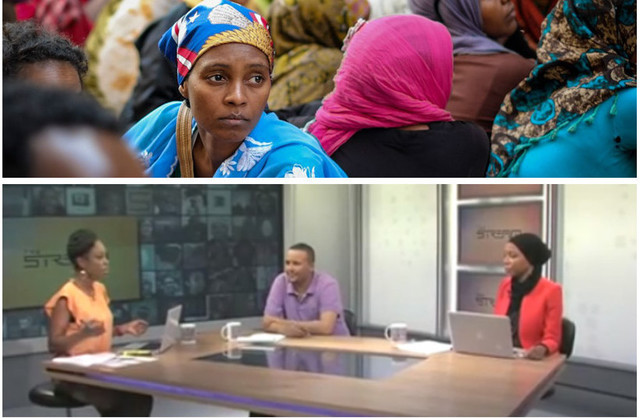 (Images Aljazeera English/YouTube)
(Images Aljazeera English/YouTube)
Tadias Magazine
Editorial
Published: July 11, 2013
New York (TADIAS) – Aljazeera’s recent airing of a segment entitled Oromos Seek Justice in Ethiopia: Why is the Largest Ethnic Group Also one of the Most Persecuted? is receiving quite a bit of attention and circulation on several websites and on social media among the Ethiopian Diaspora. The episode, which featured a panel including Jawar Mohammed, an Oromo rights advocate; Fido Ebba, Foreign Affairs Representative of the Oromo Liberation Front (OLF); and Mohammed Ademo, a journalist and editor of OPride.com, was by no means a balanced representation of the Oromo ethnic group. Nor did it encompass the diversity of views of Oromos in Ethiopia and the Diaspora. However, the reaction to the panel discussion and the panelists is just as worrisome.
With the advent of the Internet and social media, whether we like it or not, we have entered an unchartered territory when it comes to regulating how we receive, process and deliver information. The speed with which we are informed or mis-informed is unprecedented.
In the Ethiopian Diaspora, it seems that it has become fashionable for talking heads to pontificate, categorize, label, and re-write history at will, for an entire ethnic population, to fit their immediate agenda, and without much regard for mutual tolerance of our differences in ideologies or opinions.
We are reminded of Rwanda in the 90′s, even before Twitter and Facebook, when hard-lined propagandists played a crucial role in driving the country to genocide using primarily only radio and print media to spread false news and encourage hate and violence. From early April to mid-July in 1994, within a matter of 3 months, between 500,000 and one million people were wiped out in what is now described as the biggest ethnic genocide in recent memory. It’s widely accepted that the mayhem was mostly fueled by media propaganda.
Ethiopia is a nation with over eighty million people. It is one of the most diverse cultural, linguistic, ethnic and religious populations in the world. Like many other countries around the globe, the country’s problems are also as vast as its population. The solutions must come from all of us being mindful of encouraging tolerance and mutual respect. Using social media to discuss ethnic politics has its drawbacks as it has its benefits, and it’s time to recognize our individual and collective responsibilities to not disseminate one-sided, unthoughtful rhetoric.
—
Join the conversation on Twitter and Facebook

























